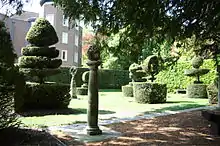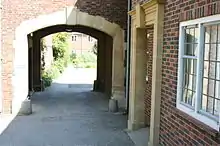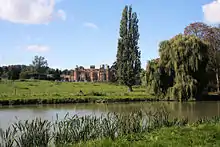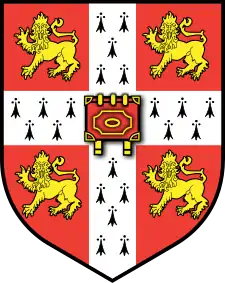Institute of Continuing Education
The Institute of Continuing Education (ICE) is a department of the University of Cambridge dedicated to providing accessible courses which allow adults of all ages, irrespective of previous educational attainment, to access higher education and obtain qualifications.
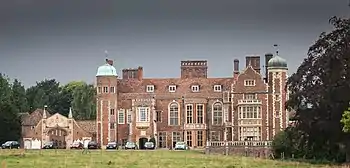 The Institute's headquarters at Madingley Hall | |
| Established | 1873 |
|---|---|
| Founder | James Stuart |
| Affiliation | University of Cambridge |
| Director | Dr James Gazzard |
| Location | , |
The institute has an annual enrolment of over 6,000 students, including around 1,000 students from over 60 countries who attend the University of Cambridge’s annual international summer programme.[1] Students can choose from around 250 different courses across three broad disciplinary themes: Arts and Sciences; Creative Writing and English Literature; and Professional Studies.[2]
The institute has its origins in a series of lectures given by James Stuart in 1867. It is primarily based at Madingley Hall, situated to the west of Cambridge, England.
History
The Institute of Continuing Education (ICE) was founded as the Local Lectures Syndicate in 1873 by the University of Cambridge engineer James Stuart.[3][4] It was later known as The Board of Extra-Mural Studies from 1924 until 1991,[5] when it was renamed as The Board for Continuing Education. The institute received its current name on 1 January 2001.[6]
In 1867, the suffragist Anne Clough and the North of England Council for Promoting the Higher Education of Women commissioned James Stuart to deliver a course of lectures in five English cities in direct response to the growing need for educational opportunity for girls and women.[7][8] These lecturers marked the beginning of the university extension movement. The University of Cambridge sanctioned the movement in 1873 with the first course offered in Derby in the same year.[9]
In 1873 the Local Lectures Syndicate was appointed, which included James Stuart, as well as Brooke Westcott, Joseph Lightfoot, and Henry Sidgwick.[10] ICE moved to Madingley Hall in 1975,[11] but it has been educating part-time and adult students since the 1860s.[12] It is the oldest continuing education department in the United Kingdom.[11]
Location and buildings
The institute's headquarters are in the village of Madingley, Cambridgeshire. It is housed in Madingley Hall, about four miles west of the Cambridge city limits.[12] Madingley Hall was built in the 1540s and was later rented by Queen Victoria for the young Prince of Wales (later Edward VII) while he was a student at Cambridge.[11][12][13]
Academic overview
ICE offers residential, online, weekend, summer, and part-time courses, as well as public lectures. The duration of study varies, from one and two-day courses, through two-year part-time master's degrees, and courses are often taken for personal interest or for professional development.[11] The academic staff are called "lecturers", and the institute's teaching is also accomplished by a group of about 300 "tutors" located in the Cambridge area and elsewhere.[11][3] The institute also provides free public concerts performed by Cambridge musicians, featuring new student work alongside more traditional repertoire.[14][15]
Undergraduate Certificates, Diplomas and Advanced Diplomas
ICE’s undergraduate courses cover over 30 subjects[16] and all courses are accredited via the United Kingdom's Credit Accumulation and Transfer Scheme (CATS).[12]
Postgraduate Certificates and Diplomas
ICE's one-year part-time postgraduate (FHEQ level 7) courses give students the opportunity to gain a recognised qualification in the arts, sciences or professional disciplines.[17]
Part-Time Master's Degrees
Master of Studies (MSt) degrees at ICE are usually undertaken over two years.[18] In the 2018-19 academic year, ICE led the introduction of Apprenticeships at Cambridge University to offer skill-based apprentice courses, giving students the opportunity to earn a postgraduate qualification in a select range of professional fields.[19]
In 2020, ICE offered two new vocational master's degree courses: a master’s degree in writing for performance, covering theatre, performance poetry, film, TV, radio and stand-up comedy, and the UK’s first ever master’s degree in the responsible use of artificial intelligence. The latter qualification is designed for technology makers and other professionals who wish to ensure their products cause no harm or augment bias and injustice such as sexism.[20][21]
Short Courses
In September 2019, ICE launched a new series of short courses called ‘Super Tuesdays,’ which provided a three-hour introduction to a specific topic for adults of all ages, with no previous qualifications necessary.[22]
Supervision by university
In 2008, when Cambridge University indirectly offered its stamp of approval for certificates in subjects like "garden history" and "well-being", the university faced accusations of dumbing down.[23] According to The Daily Telegraph, the university decided to, "take over the awarding of certificates currently offered by bodies such as the Cambridge Institute of Continuing Education….”[23]
Today, the work of ICE is controlled by the general board of the university, through a management committee. The institute's lecturers are all appointed by the university.[3]
References
- "2018–2019 Annual Report" (PDF). University of Cambridge Institute of Continuing Education. Retrieved 20 January 2021.
- "Course search". www.ice.cam.ac.uk. Retrieved 2021-01-20.
- Barlow, Adrian. Extramural: Literature and Lifelong Learning, pp. 18-19. (Lutterworth Press 2012).
- Beyeler, Marc (2015-05-15). "Institute of Continuing Education to sponsor Team of the Year prize at News' Junior Sports Award". Cambridge News. Archived from the original on 2015-07-24.
- Anonymous (2020-04-30). "Extra-Mural Studies". www.lib.cam.ac.uk. Retrieved 2021-02-05.
- "Annual Report of the Board of Continuing Education, re-constituted as the Institute of Continuing Education, 2001-02". Cambridge University Reporter. Archived from the original on 2015-12-10.
- "Clough, Anne Jemima (1820–1892), college head and promoter of women's education". Oxford Dictionary of National Biography. doi:10.1093/ref:odnb/9780198614128.001.0001/odnb-9780198614128-e-5710. Retrieved 2021-02-05.
- Cunningham, Peter (2009). Beyond the Lecture Hall: Universities and community engagement rom the middle ages to the present day. University of Cambridge. p. 21. ISBN 978-0-9560861-2-9.
- Jarvis, Peter. Adult Education and Lifelong Learning: Theory and Practice, p. 318 (Routledge 2004).
- Welch, Edwin (1974). The Peripatetic University. England: Cambridge University Press. p. 43. ISBN 9780521201520.
- Care, Adam (October 24, 2014). "You're never too old for a Cambridge education". Cambridge News. Archived from the original on 2015-09-23.
- Henderson, C.W. Open the Gates to the Ivy League: A Plan B for Getting into the Top Colleges, p. 87 (Penguin 2013).
- Care, Adam (2015-04-23). "More than 380 species discovered at Cambridge University's Madingley Hall". Cambridge News. Archived from the original on 2015-09-23. Retrieved 2015-06-13.
- paulireland (2015-02-18). "Ghislaine McMullin plays Russian cello music". Cambridge News. Archived from the original on 2015-07-21.
- Institute of Continuing Education. "Institute of Continuing Education (ICE): Concerts". Archived from the original on 2019-05-12. Retrieved 2019-07-26.
- Davison, Tim (2016-05-19). "Undergraduate Certificates, Diplomas and Advanced Diplomas". www.ice.cam.ac.uk. Retrieved 2021-02-05.
- Davison, Tim (2016-05-19). "Postgraduate Certificates and Diplomas". www.ice.cam.ac.uk. Retrieved 2021-02-05.
- Davison, Tim (2016-05-19). "Part-time Master's Degrees". www.ice.cam.ac.uk. Retrieved 2021-02-05.
- "Cambridge University to offer apprenticeship training". BBC News. 2018-02-08. Retrieved 2021-02-05.
- "Cambridge University launches master's degree in responsible use of AI". The Independent. 2020-12-06. Retrieved 2021-02-05.
- "Cambridge University launches Master's degree in the responsible use of AI". Scientific Computing World. 2020-12-08. Retrieved 2021-02-05.
- "A new programme called Super Tuesdays is set to start at Cambridge University's Institute of Continuing Education". Cambridge Independent. 2019-09-12. Retrieved 2021-02-05.
- Bingham, John (2008-12-22). "Garden history and 'wellbeing' qualifications from Cambridge University". The Daily Telegraph. Archived from the original on 2019-04-25.
